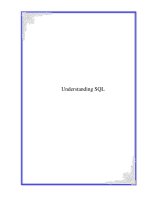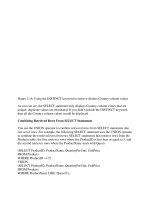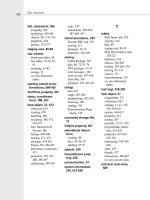Tài liệu Firebird SQL Reference Guide ppt
Bạn đang xem bản rút gọn của tài liệu. Xem và tải ngay bản đầy đủ của tài liệu tại đây (500.06 KB, 123 trang )
Firebird SQL Reference Guide
The complete reference of all SQL keywords and commands supported by Firebird
Members of the Firebird Documentation project
December 2007
Table of Contents
Introduction 6
DSQL 6
ESQL 6
ISQL 6
PSQL 6
Alphabetical keyword and function index 6
ABS() [2.1] 6
ACOS() [2.1] 7
ALTER DATABASE 8
ALTER DATABASE BEGIN/END BACKUP [2.0] 8
ALTER DOMAIN 9
ALTER EXTERNAL FUNCTION [2.0] 9
ALTER INDEX 9
ALTER PROCEDURE 10
ALTER SEQUENCE RESTART WITH [2.0] 11
ALTER TABLE 12
ALTER TRIGGER 14
ASCII_CHAR() [2.1] 14
ASCII_VAL() [2.1] 16
ASIN() [2.1] 17
ATAN() [2.1] 18
ATAN2() [2.1] 18
AVG( ) 19
BASED ON 20
BEGIN DECLARE SECTION 20
BIN_AND() [2.1] 20
BIN_OR() [2.1] 21
BIN_SHL() [2.1] 22
BIN_SHR() [2.1] 23
BIN_XOR() [2.1] 24
BIT_LENGTH / CHAR_LENGTH / CHARACTER_LENGTH / OCTET_LENGTH [2.0]
24
CASE [1.5] 25
CAST( ) 27
CEIL() / CEILING() [2.1] 27
CLOSE 28
CLOSE (BLOB) 29
COALESCE [1.5] 29
COLLATE (BLOB) [2.0] 30
COLLATE [PSQL] [2.1] 30
COMMENT [2.0] 30
COMMIT 32
CONNECT 32
COS() [2.1] 33
COSH() [2.1] 33
COT() [2.1] 34
COUNT( ) 35
CREATE COLLATION [2.1] 35
CREATE DATABASE 36
CREATE DOMAIN 39
CREATE EXCEPTION 40
CREATE GENERATOR 41
ii
CREATE GLOBAL TEMPORARY TABLE [2.1] 41
CREATE INDEX 41
CREATE INDEX COMPUTED BY [2.0] 42
CREATE OR ALTER EXCEPTION [2.0] 42
CREATE OR ALTER {TRIGGER | PROCEDURE } [1.5] 42
CREATE PROCEDURE 42
CREATE ROLE 43
CREATE SEQUENCE [2.0] 43
CREATE SHADOW 44
CREATE TABLE 45
CREATE TRIGGER 46
CREATE TRIGGER ON CONNECT [2.1] 47
CREATE TRIGGER ON DISCONNECT [2.1] 47
CREATE TRIGGER ON TRANSACTION COMMIT [2.1] 47
CREATE TRIGGER ON TRANSACTION ROLLBACK [2.1] 47
CREATE TRIGGER ON TRANSACTION START [2.1] 47
CREATE VIEW 47
CREATE VIEW [with column alias] [2.1] 48
CROSS JOIN [2.0] 48
CURRENT_CONNECTION [1.5] 48
CURRENT_ROLE [1.5] 49
CURRENT_TRANSACTION [1.5] 50
CURRENT_USER [1.5] 51
CURSOR FOR [2.0] 52
DATEADD() [2.1] 52
DATEDIFF() [2.1] 53
DECLARE CURSOR 55
DECLARE CURSOR (BLOB) 55
DECLARE EXTERNAL FUNCTION 55
DECLARE FILTER 56
DECLARE STATEMENT 56
DECLARE TABLE 57
DECODE() [2.1] 57
DELETE 58
DESCRIBE 59
DISCONNECT 59
DROP DATABASE 59
DROP DEFAULT [2.0] 60
DROP DOMAIN 60
DROP EXCEPTION 60
DROP EXTERNAL FUNCTION 60
DROP FILTER 61
DROP GENERATOR 61
DROP GENERATOR revisited [1.5] 62
DROP INDEX 62
DROP PROCEDURE 62
DROP ROLE 62
DROP SEQUENCE [2.0] 63
DROP SHADOW 64
DROP TABLE 64
DROP TRIGGER 64
DROP VIEW 65
END DECLARE SECTION 65
EVENT INIT 65
EVENT WAIT 66
EXECUTE 66
EXECUTE BLOCK [2.0] 67
Firebird SQL Reference Guide
iii
EXECUTE IMMEDIATE 67
EXECUTE PROCEDURE 67
EXECUTE STATEMENT [1.5] 68
EXP() [2.1] 68
EXTRACT( ) 69
FETCH 69
FETCH (BLOB) 69
FIRST(m) SKIP(n) 70
FLOOR() [2.1] 70
FOR UPDATE [WITH LOCK] [1.5] 71
GDSCODE [1.5] 71
GEN_ID( ) 71
GEN_UUID() [2.1] 71
GRANT 72
HASH() [2.1] 73
IIF [2.0] 74
INSERT 75
INSERT CURSOR (BLOB) 75
INSERT INTO DEFAULT VALUES [2.1] 76
INSERTING, UPDATING, DELETEING [1.5] 76
LEAVE / BREAK [1.5] 76
LEAVE [<label_name>] [2.0] 77
LEFT() [2.1] 77
LIKE ESCAPE?? [1.5] 77
LIST() [2.1] 78
LN() [2.1] 79
LOG() [2.1] 80
LOG10() [2.1] 80
LOWER() [2.0] 81
LPAD() [2.1] 82
MAX( ) 83
MAXVALUE() [2.1] 84
MIN( ) 84
MINVALUE() [2.1] 85
MOD() [2.1] 86
MON$ Tables [2.1] 87
NATURAL JOIN [2.1] 87
NEXT VALUE FOR [2.0] 87
NULLIF [1.5] 88
OPEN 89
OVELAY() [2.1] 89
PI() [2.1] 91
POSITION() [2.1] 91
POWER() [2.1] 92
PREPARE 93
RAND() [2.1] 93
RDB$GET_CONTEXT [2.0] 94
RDB$SET_CONTEXT [2.0] 94
RECREATE EXCEPTION [2.0] 94
RECREATE PROCEDURE 94
RECREATE TABLE 95
RECREATE TRIGGER [2.0] 95
RECREATE VIEW 95
RELEASE SAVEPOINT [1.5] 95
REPLACE() [2.1] 95
RETURNING [2.1] 96
REVERSE() [2.1] 98
Firebird SQL Reference Guide
iv
REVOKE 99
REVOKE ADMIN OPTION FROM [2.0] 100
RIGHT() [2.1] 100
ROLLBACK 101
ROLLBACK RETAIN [2.0] 101
ROLLBACK [WORK] TO [SAVEPOINT] [1.5] 101
ROUND() [2.1] 101
ROWS [2.0] 102
ROW_COUNT [1.5] 103
RPAD() [2.1] 103
SAVEPOINT [1.5] 104
SELECT 104
SET DATABASE 106
SET DEFAULT [2.0] 106
SET GENERATOR 106
SET HEAD[ing] toggle [2.0] 107
SET NAMES 107
SET SQL DIALECT 107
SET SQLDA_DISPLAY ON/OFF [2.0] 108
SET STATISTICS 108
SET TRANSACTION 108
SHOW SQL DIALECT 108
SIGN() [2.1] 109
SIN() [2.1] 110
SINH() [2.1] 111
SQL Commands 112
SQLCODE [1.5] 112
SQRT() [2.1] 112
SUBSTRING( ) 113
SUM( ) 113
TAN() [2.1] 113
TANH() [2.1] 114
TEMPLATE for new entries [VER] 115
TRIM() [2.0] 116
TRUNC() [2.1] 117
TYPE OF [domains in PSQL] [2.1] 117
UNION DISTINCT [2.0] 118
UPDATE 118
UPDATE OR INSERT [2.1] 119
UPPER( ) 120
WHENEVER 120
WITH [RECURSIVE] (CTE) [2.1] 121
A. Document history 122
B. License note 123
Firebird SQL Reference Guide
v
Introduction
The Firebird SQL Reference Guide contains an alphabetical index of all keywords and built-
in-functions available in a Firebird database.
Note that not all terms are available everywhere. At the start of every entry there is an item "Availabil-
ity" that tells in what context(s) a keyword or function can be used. The terms used there are de-
scribed in the following.
DSQL
Dynamic SQL is the context of a SQL client ( application ) sending SQL commands to the server.
ESQL
Embedded SQL is the context of a SQL command embedded in an application. This is in essence the
same as DSQL, except that every ESQL statement must be preceeded with the EXEC SQL keyword.
ISQL
ISQL (or Interactive SQL) is a command line tool that is included in the Firebird distribution. It al-
lows access to (almost) the full feature set available in Firebird, and is the recommended tool to nar-
row down the source of a potential problem with a SQL command should you find one. Unlike most
other connectivity components and tools, ISQL shows also warning messages that may not be shown
PSQL
PSQL (or Procedural SQL) is the SQL context used in Stored Procedures and Triggers. There are
some special commands and keywords only available in PSQL, like the NEW and OLD context vari-
ables in triggers. But there are also some limitations against D/E/ISQL: as a rule of thumb, PSQL is
limited to DML (Data Manipulation Language), while the other flavours also allow DDL (Data Defin-
ition Language) statements.
Alphabetical keyword and function index
ABS() [2.1]
Returns the absolute value of a number.
6
Availability: DSQL ESQL ISQL PSQL
Syntax
ABS(<numeric expression>)
Important
<Notes>
Argument Description
<number expression> The numeric expression whose absolute value is returned
Description
Returns the absolute value of a number. The result is always >= 0.
Examples
select abs(amount) from transactions
select abs(4-7) from rdb$database
(returns 3)
select abs(NULL) from rdb$database
(returns NULL)
See also: SIGN()
ACOS() [2.1]
Returns the arc cosine of a number.
Availability: DSQL ESQL ISQL PSQL
Syntax
ACOS(<numeric expression>)
Firebird SQL Reference Guide
7
Important
The argument to ACOS must be in the range -1 to 1.
Argument Description
<number expression> The numeric expression whose arc cosine is returned
Description
Returns the arc cosine of a number. Argument to
ACOS must be in the range -1 to 1. Returns a value
in the range 0 to PI.
Examples
select acos(x) from y
See also: COS(), SIN()
ALTER DATABASE
Adds secondary files to the current database.
Availability: DSQL ESQL ISQL PSQL
Syntax
ALTER {DATABASE | SCHEMA}
ADD <add_clause>;
<add_clause> = FILE 'filespec' [<fileinfo>] [<add_clause>
]
<fileinfo> = LENGTH [=] int [PAGE[S]]
| STARTING [AT [PAGE]] int [<fileinfo>]
(This text is currently not included because of possible copyright issues.)
See also: CREATE DATABASE, DROP DATABASE
See also: the Data Definition Guide for more information about multifile databases and the Opera-
tions Guide for more information about exclusive database access.
Firebird SQL Reference Guide
8
ALTER DATABASE BEGIN/END BACKUP [2.0]
(no contents yet)
ALTER DOMAIN
Changes a domain definition.
Availability: DSQL ESQL ISQL PSQL ALTER DOMAIN { name | old_name TO new_name } SET
DEFAULT {literal | NULL | USER} | DROP DEFAULT | ADD [CONSTRAINT] CHECK
(<dom_search_condition>) | DROP CONSTRAINT | new_col_name | TYPE datatype;
<dom_search_condition> = VALUE <operator> <val> | VALUE [NOT] BETWEEN <val> AND
<val> | VALUE [NOT] LIKE <val> [ESCAPE <val>] | VALUE [NOT] IN (<val> [, <val> ]) |
VALUE IS [NOT] NULL | VALUE [NOT] CONTAINING <val> | VALUE [NOT] STARTING
[WITH] <val> | (<dom_search_condition>) | NOT <dom_search_condition> |
<dom_search_condition> OR <dom_search_condition> | <dom_search_condition> AND
<dom_search_condition> <operator> = {= | < | > | <= | >= | !< | !> | < > | !=}
(This text is currently not included because of possible copyright issues.)
See also: CREATE DOMAIN, CREATE TABLE, DROP DOMAIN, For a complete discussion of
creating domains, and using them to create column definitions, see Firebird domains in Using Fire-
bird- Domains and Generators (ch. 15 p. 285). ALTER EXCEPTION Changes the message associated
with an existing exception.
Availability1: DSQL ESQL ISQL PSQL
Syntax
ALTER EXCEPTION name 'message'
Argument1: Description name Name of an existing exception message 'message' Quoted string con-
taining ASCII values
See also: ALTER PROCEDURE, ALTER TRIGGER, CREATE EXCEPTION, CREATE PRO-
CEDURE, CREATE TRIGGER, DROP EXCEPTION, For more information on creating, raising, and
handling exceptions, refer to Using Firebird- Error trapping and handling (ch. 25 p. 549).
ALTER EXTERNAL FUNCTION [2.0]
(no contents yet)
ALTER INDEX
Activates or deactivates an index.
Firebird SQL Reference Guide
9
Availability: DSQL ESQL ISQL PSQL
Syntax
ALTER INDEX name {ACTIVE | INACTIVE};
(This text is currently not included because of possible copyright issues.)
See also: ALTER TABLE, CREATE INDEX, DROP INDEX, SET STATISTICS
ALTER PROCEDURE
Changes the definition of an existing stored procedure.
Availability: DSQL ESQL ISQL PSQL
Syntax
ALTER PROCEDURE name
[(param <datatype> [, param <datatype> ])]
[RETURNS (param <datatype> [, param <datatype> ])]
AS <procedure_body> [terminator]
(This text is currently not included because of possible copyright issues.)
See also: CREATE PROCEDURE for a complete description terminator Terminator defined by the
ISQL SET TERM command to signify the end of the procedure body; required by ISQL
Syntax
SET TERM <new terminator> <old terminator>
The <old terminator> is not part of the command, but the command
terminator. Because SET TERM is exclusively an ISQL command, the command
terminator is always required.
A procedure can be altered by its creator, the SYSDBA user and, on
Linux/UNIX, the root user and any user with root privileges
Procedures in use are not altered until they are no longer in use.
ALTER PROCEDURE changes take effect when they are committed. Changes are
then reflected in all applications that use the procedure without
recompiling or relinking.
See also: CREATE PROCEDURE, DROP PROCEDURE, EXECUTE PROCEDURE, For more in-
formation on creating and using procedures, see Using Firebird- Programming on Firebird Server (ch.
25 p. 494)., For a complete description of the statements in procedure and trigger language, refer to
Firebird SQL Reference Guide
10
PSQL-Firebird Procedural Language. ALTER PROCEDURE Changes the definition of an existing
stored procedure.
Availability1: DSQL ESQL ISQL PSQL
Syntax
ALTER PROCEDURE name
[(param <datatype> [, param <datatype> ])]
[RETURNS (param <datatype> [, param <datatype> ])]
AS <procedure_body> [terminator]
Argument1: Description name Name of an existing procedure param datatype Input parameters used
by the procedure; valid datatypes are listed under CREATE PROCEDURE RETURNS param data-
type Output parameters used by the procedure; valid datatypes are listed under CREATE PROCED-
URE procedure_body The procedure body includes: o Local variable declarations o A block of state-
ments in procedure and trigger language
See also: CREATE PROCEDURE for a complete description terminator Terminator defined by the
ISQL SET TERM command to signify the end of the procedure body; required by ISQL
Syntax
SET TERM <new terminator> <old terminator>
The <old terminator> is not part of the command, but the command
terminator. Because SET TERM is exclusively an ISQL command, the command
terminator is always required.
A procedure can be altered by its creator, the SYSDBA user and, on
Linux/UNIX, the root user and any user with root privileges
Procedures in use are not altered until they are no longer in use.
ALTER PROCEDURE changes take effect when they are committed. Changes are
then reflected in all applications that use the procedure without
recompiling or relinking.
See also: CREATE PROCEDURE, DROP PROCEDURE, EXECUTE PROCEDURE, For more in-
formation on creating and using procedures, see Using Firebird- Programming on Firebird Server (ch.
25 p. 494)., For a complete description of the statements in procedure and trigger language, refer to
PSQL-Firebird Procedural Language.
ALTER SEQUENCE RESTART WITH [2.0]
Sets the current value of a sequence / generator
Availability: +DSQL +ESQL +ISQL -PSQL
Syntax
Firebird SQL Reference Guide
11
ALTER SEQUENCE <name> RESTART WITH <start_value>
Important
ALTER SEQUENCE, like SET GENERATOR, is a good way to screw up the generation of key
values! It is important to know that sequences and generators are outside of any transaction control.
Argument Description
<name> name of the sequence / generator to be set
<start_value> new starting value for the sequence / generator
Description
This is the SQL-99-compliant (and therefor recommended) syntax for the SET GENERATOR com-
mand.
It directly sets a sequence / generator to the given value.
The command is not available in PSQL since it is a DDL and not a DML statement
(this can, however, be surpassed by the use of EXECUTE STATEMENT).
This command is useful to reset e.g. an ID-generating sequence after a DELETE FROM <table>,
but in almost all other circumstances it is a dangerous thing to do.
Read the "Generator Guide" which is available as part of the Firebird documentation set
for an in-depth discussion of the use of sequences / generators, and esp. why it
is dangerous and not recommended to use this statement in live databases.
Examples
ALTER SEQUENCE SEQ_ID_EMPLOYEE RESTART WITH 1;
(equivalent to SET GENERATOR SEQ_ID_EMPLOYEE TO 1)
See also: SET GENERATOR, CREATE SEQUENCE, DROP SEQUENCE, NEXT VALUE FOR
ALTER TABLE
Changes a table by adding, dropping, or modifying columns or integrity constraints.
Firebird SQL Reference Guide
12
Availability: DSQL ESQL ISQL PSQL
Syntax
ALTER TABLE table <operation> [, <operation> ];
<operation> = ADD <col_def>
| ADD <tconstraint>
| ALTER [COLUMN] column_name <alt_col_clause>
| DROP col
| DROP CONSTRAINT constraint
<alt_col_clause> = TO new_col_name
| TYPE new_col_datatype
| POSITION new_col_position
<col_def> = col {<datatype> | COMPUTED [BY] (<expr>) |
domain}
[DEFAULT {literal | NULL | USER}]
[NOT NULL]
[<col_constraint>]
[COLLATE collation]
<datatype> =
{SMALLINT | INTEGER | FLOAT | DOUBLE PRECISION}[<array_dim>]
| (DATE | TIME | TIMESTAMP} [<array_dim>]
| {DECIMAL | NUMERIC} [(precision [, scale])] [<array_dim>]
| {CHAR | CHARACTER | CHARACTER VARYING | VARCHAR} [(int)]
[<array_dim>] [CHARACTER SET charname]
| {NCHAR | NATIONAL CHARACTER | NATIONAL CHAR}
[VARYING] [(int)] [<array_dim>]
| BLOB [SUB_TYPE {int | subtype_name}] [SEGMENT SIZE int]
[CHARACTER SET charname]
| BLOB [(seglen [, subtype])]
<array_dim> = [[x:]y [, [x:]y ]]
<expr> = a valid SQL expression that results in a single value
<col_constraint> = [CONSTRAINT constraint]
{ UNIQUE
| PRIMARY KEY
| REFERENCES other_table [(other_col [, other_col ])]
[ON DELETE {NO ACTION|CASCADE|SET DEFAULT|SET NULL}]
[ON UPDATE {NO ACTION|CASCADE|SET DEFAULT|SET NULL}]
| CHECK (<search_condition>)}
<tconstraint> = [CONSTRAINT constraint]
{{PRIMARY KEY | UNIQUE} (col [, col ])
| FOREIGN KEY (col [, col ])
REFERENCES other_table [(other_col [, other_col ])]
[ON DELETE {NO ACTION|CASCADE|SET DEFAULT|SET NULL}]
[ON UPDATE {NO ACTION|CASCADE|SET DEFAULT|SET NULL}]
| CHECK (<search_condition>)}
<search_condition> = <val> <operator> {<val> | (<
select_one>)}
| <val> [NOT] BETWEEN <val> AND <val>
| <val> [NOT] LIKE <val> [ESCAPE <val>]
| <val> [NOT] IN (<val> [, <val> ] | <
select_list>)
| <val> IS [NOT] NULL
| <val> {>= | <=} <val>
| <val> [NOT] {= | < | >} <val>
| {ALL | SOME | ANY} (<select_list>)
| EXISTS (<select_expr>)
| SINGULAR (<select_expr>)
| <val> [NOT] CONTAINING <val>
| <val> [NOT] STARTING [WITH] <val>
| (<search_condition>)
| NOT <search_condition>
Firebird SQL Reference Guide
13
| <search_condition> OR <search_condition>
| <search_condition> AND <search_condition>
<val> = { col [<array_dim>] | :variable
| <constant> | <expr> | <function>
| udf ([<val> [, <val> ]])
| NULL | USER | RDB$DB_KEY | ? }
[COLLATE collation]
<constant> = num | 'string' | _charsetname 'string'
<function> = COUNT (* | [ALL] <val> | DISTINCT <val>)
| SUM ([ALL] <val> | DISTINCT <val>)
| AVG ([ALL] <val> | DISTINCT <val>)
| MAX ([ALL] <val> | DISTINCT <val>)
| MIN ([ALL] <val> | DISTINCT <val>)
| CAST (<val> AS <datatype>)
| UPPER (<val>)
| GEN_ID (generator, <val>)
<operator> = {= | < | > | <= | >= | !< | !> | <
> | !=}
<select_one> = SELECT on a single column; returns exactly one value.
<select_list> = SELECT on a single column; returns zero or more
values.
<select_expr> = SELECT on a list of values; returns zero or more
values.
(This text is currently not included because of possible copyright issues.)
See also: ALTER DOMAIN, CREATE DOMAIN, CREATE TABLE, For more information about
altering tables, see Using Firebird- Altering tables (ch. 17 p. 340).
ALTER TRIGGER
Changes an existing trigger.
Availability: DSQL ESQL ISQL PSQL
Syntax
ALTER TRIGGER name
[ACTIVE | INACTIVE]
[{BEFORE | AFTER} {DELETE | INSERT | UPDATE}]
[POSITION number]
[AS <trigger_body>] [terminator]
(This text is currently not included because of possible copyright issues.)
See also: CREATE TRIGGER, DROP TRIGGER, For a complete description of the statements in
procedure and trigger language, PSQL-Firebird Procedural Language., For more information, see Us-
ing Firebird- Triggers (ch. 25 p. 532).
ASCII_CHAR() [2.1]
Firebird SQL Reference Guide
14
Returns the ASCII character with the specified code
Availability: DSQL ESQL ISQL PSQL
Syntax
ASCII_CHAR(<numeric expression>)
Important
The argument to ASCII_CHAR must be in the range 0 to 255.
Argument Description
<numeric expression> The code for the ASCII character to be returned
Description
Returns the ASCII character with the specified
code. The argument to ASCII_CHAR must be in the
range 0 to 255. The result is returned in character set
NONE.
Examples
1. DSQL
select ascii_char(65) from rdb$database
(returns 'A')
2. PSQL
mystr = mystr || ascii_char(13) || ascii_char(10);
(adds a Carriage Return + Line Feed to mystr)
3. PSQL
The following selectable procedure returns the alphabet in upper and lower
case:
CREATE PROCEDURE ALPHABET
returns (ALPHA_UPPER char(26), ALPHA_LOWER char(26))
AS
declare variable i integer;
begin
ALPHA_UPPER = '';
ALPHA_LOWER = '';
Firebird SQL Reference Guide
15
i = 0;
while (i < 26) do
begin
ALPHA_UPPER = TRIM(ALPHA_UPPER) || ASCII_CHAR(i + 65);
ALPHA_LOWER = TRIM(ALPHA_LOWER) || ASCII_CHAR(i + 65 + (ASCII_VAL('a')-
ASCII_VAL('A')));
i = i + 1;
end
suspend;
end
See also: ASCII_VAL()
ASCII_VAL() [2.1]
Returns the ASCII code of the first character of the specified string.
Availability: DSQL ESQL ISQL PSQL
Syntax
ASCII_VAL(<val>)
Important
if <val> is (or evaluates to) NULL, the result is NULL
Argument Description
<val> A column, constant, host-language variable, expression, function, or UDF
that evaluates to a character datatype
Description
Returns the ASCII code of the first character of the
specified string.
Rules: 1. Returns 0 if the string is empty 2. Throws an error if the first character is multi-byte 3. Re-
turns NULL if <val> is (or evaluates to) NULL
Examples
Firebird SQL Reference Guide
16
select ascii_val(x) from y
select ascii_val('A') from rdb$database
(returns 65)
See also: ASCII_CHAR()
ASIN() [2.1]
Returns the arc sine of a number.
Availability: DSQL ESQL ISQL PSQL
Syntax
ASIN(<number>)
Important
The argument to ASIN must be in the range -1 to 1.
Argument Description
<number> The number or numeric expression whose arc sine is returned
Description
Returns the arc sine of a number. Argument to
ASIN must be in the range -1 to 1. Returns a value
in the range -PI/2 to PI/2.
Examples
select asin(-1) from rdb$database
(returns 1,5707963267949 = -PI/2)
select asin(0) from rdb$database
(returns 0)
select asin(1) from rdb$database
(returns 1,5707963267949 = PI/2)
Firebird SQL Reference Guide
17
See also: COS(), SIN()
ATAN() [2.1]
Returns the arc tangent of a number.
Availability: DSQL ESQL ISQL PSQL
Syntax
ATAN(<number>)
Important
The argument to ATAN must be in the range -1 to 1.
Argument Description
<number> The number or numeric expression whose arc tangent is returned
Description
Returns the arc sine of a number. Argument to
ATAN must be in the range -1 to 1. Returns a value
in the range -PI/2 to PI/2.
Examples
select atan(-1) from rdb$database
(returns -0,7853981633974 = -PI/4)
select atan(0) from rdb$database
(returns 0)
select atan(1) from rdb$database
(returns 0,7853981633974 = PI/4)
See also: COS(), SIN()
Firebird SQL Reference Guide
18
ATAN2() [2.1]
Returns the arc tangent of the first number / the second number.
Availability: DSQL ESQL ISQL PSQL
Syntax
ATAN2(<number1>,<number2>)
Important
The arguments to ATAN2 must be in the range -1 to 1.
Argument Description
<number1> The first numeric expression whose arc tangent is returned
<number2> The second numeric expression whose arc tangent is returned
Description
Returns the arc tangent of the first number / the second
number. Returns a value in the range -PI to PI.
Examples
select atan2(1,1) from rdb$database
(returns 0,7853981633974 = PI/4)
select atan2(0,0) from rdb$database
(returns 0)
See also: COS(), SIN()
AVG( )
Calculates the average of numeric values in a specified column or expression.
Availability: DSQL ESQL ISQL PSQL
Syntax
Firebird SQL Reference Guide
19
AVG ([ALL] value | DISTINCT value)
(This text is currently not included because of possible copyright issues.)
See also: COUNT( ), MAX( ), MIN( ), SUM( )
BASED ON
Declares a host-language variable based on a column.
Availability: DSQL ESQL ISQL PSQL
Syntax
BASED [ON] [dbhandle.]table.col[.SEGMENT] variable;
(This text is currently not included because of possible copyright issues.)
See also: BEGIN DECLARE SECTION, CREATE TABLE, END DECLARE SECTION
BEGIN DECLARE SECTION
Identifies the start of a host-language variable declaration section.
Availability: DSQL ESQL ISQL PSQL
Syntax
BEGIN DECLARE SECTION;
(This text is currently not included because of possible copyright issues.)
See also: BASED ON, END DECLARE SECTION
BIN_AND() [2.1]
Returns the result of a binary AND operation performed on all arguments.
Availability: DSQL ESQL ISQL PSQL
Firebird SQL Reference Guide
20
Syntax
BIN_AND( <number>[, <number> ] )
Important
<Notes>
Argument Description
<number> The numbers that the binary AND operation is executed on
Description
Examples
SELECT bin_and(1,3,7) from rdb$database
(returns 1)
SELECT bin_and(2,6,10) from rdb$database
(returns 2)
See also: BIN_OR(), BIN_XOR()
BIN_OR() [2.1]
Returns the result of a binary OR operation performed on all arguments.
Availability: DSQL ESQL ISQL PSQL
Syntax
BIN_OR( <number>[, <number> ] )
Important
<Notes>
Firebird SQL Reference Guide
21
Argument Description
<number> The numbers that the binary OR operation is executed on
Description
Examples
SELECT bin_and(1,3,7) from rdb$database
(returns 7)
SELECT bin_or(2,6,10) from rdb$database
(returns 14)
See also: BIN_AND(), BIN_XOR()
BIN_SHL() [2.1]
Returns the result of a binary shift left operation performed on the arguments (first << second).
Availability: DSQL ESQL ISQL PSQL
Syntax
BIN_SHL( <number1>,<number2> )
Important
<number2> must be >= 0.
Argument Description
<number1> The number that gets binary shifted left
<number2> How many bits to shift <number1> left
Description
Examples
Firebird SQL Reference Guide
22
SELECT bin_shl(16,1) from rdb$database
(returns 32)
SELECT bin_shl(16,4) from rdb$database
(returns 256)
See also: BIN_SHR()
BIN_SHR() [2.1]
Returns the result of a binary shift right operation performed on the arguments (first >> second).
Availability: DSQL ESQL ISQL PSQL
Syntax
BIN_SHL( <number1>,<number2> )
Important
<number2> must be >= 0.
Argument Description
<number1> The number that gets binary shifted right
<number2> How many bits to shift <number1> right
Description
Examples
SELECT bin_shr(16,1) from rdb$database
(returns 8)
SELECT bin_shr(16,4) from rdb$database
(returns 1)
SELECT bin_shr(16,8) from rdb$database
(returns 0)
See also: BIN_SHL()
Firebird SQL Reference Guide
23
BIN_XOR() [2.1]
Returns the result of a binary XOR operation performed on all arguments.
Availability: DSQL ESQL ISQL PSQL
Syntax
BIN_OR( <number>[, <number> ] )
Important
<Notes>
Argument Description
<number> The numbers that the binary XOR operation is executed on
Description
Examples
SELECT bin_xor(1,3,7) from rdb$database
(returns 5)
SELECT bin_xor(2,6,10) from rdb$database
(returns 14)
See also: BIN_AND(), BIN_OR()
BIT_LENGTH / CHAR_LENGTH / CHARACTER_LENGTH /
OCTET_LENGTH [2.0]
These functions will return information about the size of strings.
Availability: DSQL ESQL ISQL PSQL
Syntax
Firebird SQL Reference Guide
24
BIT_LENGTH(<val>)
CHAR_LENGTH(<val>)
CHARACTER_LENGTH(<val>)
OCTET_LENGTH(<val>)
Important
If no TRIM() is applied to <val>, trailing blanks in <val> will add to the result (see example).
Argument Description
<val> A column, constant, host-language variable, expression, function, or UDF
that evaluates to a character datatype
Description
These three new functions will return information about the size of strings:
1. BIT_LENGTH returns the length of a string in bits
2. CHAR_LENGTH/CHARACTER_LENGTH returns the length of a string in characters
3. OCTET_LENGTH returns the length of a string in bytes
Examples
select
rdb$relation_name,
char_length(rdb$relation_name),
bit_length(trim(rdb$relation_name)),
char_length(trim(rdb$relation_name))
octet_length(trim(rdb$relation_name))
from rdb$relations;
See also:
CASE [1.5]
Allow the result of a column to be determined by the outcome of a group of exclusive conditions.
Availability: DSQL ESQL ISQL PSQL
Syntax
Firebird SQL Reference Guide
25









